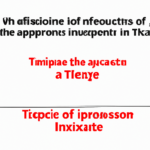Progressive taxation faces several arguments, with opponents claiming it discourages economic growth, reduces incentives to work, and promotes unfairness. Critics argue that higher tax rates on the wealthy stifle innovation and hinder investment, hampering economic development. They contend that when successful individuals are taxed heavily, they may choose to work less or move their assets to countries with lower tax rates. Moreover, opponents argue that progressive taxation undermines the principles of meritocracy by redistributing wealth from the high-achieving to the less successful. They assert that a flat tax rate would be fairer, treating all individuals equally and encouraging productivity. Critics of progressive taxation emphasize the need for a simpler, more transparent tax system that fosters economic prosperity for all.
Table of Contents
- Benefits of a flat tax system
- Disincentive for productivity and innovation
- Economic impact of progressive taxation
- Potential for tax evasion and avoidance
- Wealth redistribution concerns
(Ben Shapiro – Flat Tax vs Progressive Tax)
Progressive taxation, while often seen as a solution to income inequality, has its share of critics. One argument against progressive taxation is that it discourages productivity and hard work. Critics argue that when individuals are taxed at higher rates as they earn more, they have less incentive to work harder and earn more money. This can have a negative impact on the economy as a whole, slowing down economic growth and reducing overall prosperity.
Another argument against progressive taxation is that it can lead to capital flight. High-income earners may choose to move their money and investments to countries with lower tax rates, resulting in a loss of tax revenue for the country implementing progressive taxation. This can further exacerbate income inequality and hinder economic development.
Critics also claim that progressive taxation is inherently unfair. They argue that individuals should be allowed to keep a larger portion of their earnings as a reward for their hard work and contribution to society. Progressive taxation, they argue, penalizes success and creates a culture of entitlement, discouraging personal responsibility and self-sufficiency.
Moreover, opponents argue that progressive taxation can lead to a bloated government and inefficient use of resources. They claim that when the government has a greater pool of tax revenue, it is more likely to engage in wasteful spending and unnecessary bureaucracy. This, in turn, can hinder economic growth and limit individual freedom.
While supporters of progressive taxation believe it is necessary to address income inequality, critics argue that there are alternative solutions that can promote economic growth without penalizing success. These arguments against progressive taxation provide a counterpoint to the idea that it is the best solution for a fair and equitable society.
Benefits of a flat tax system
The flat tax system offers several benefits that counter the arguments against progressive taxation. First, it simplifies the tax code, making it easier for individuals to understand and comply with their tax obligations. This simplicity reduces the need for expensive tax preparation services and ensures that everyone pays their fair share.
Second, a flat tax system encourages economic growth by providing incentives for individuals to work harder and invest their money. With a fixed tax rate, individuals are not penalized for earning more, which allows them to keep a larger portion of their income. This increased disposable income can be used to start businesses, invest in stocks or real estate, or save for retirement. As a result, the economy is stimulated, leading to more job opportunities and higher overall prosperity.
Additionally, a flat tax system promotes fairness and equal treatment. Under a progressive tax system, high-income individuals often pay a higher tax rate, which some argue is not fair. In contrast, a flat tax applies the same rate to everyone, regardless of their income level. This equal treatment ensures that everyone contributes proportionately to the functioning of society and reduces the perception of favoritism towards certain income groups.
Another advantage of a flat tax system is its potential to reduce tax evasion and increase tax compliance. With a simpler tax code and a uniform tax rate, the loopholes and incentives for tax evasion are significantly reduced. This leads to improved tax collection rates and a more efficient allocation of resources for public services such as healthcare, education, and infrastructure.
Furthermore, a flat tax system can also streamline government operations and reduce administrative costs. Complex tax codes require a significant amount of resources to administer and enforce. By simplifying the tax system, governments can redirect these resources towards other important areas such as public safety, environmental conservation, or social welfare programs.
In conclusion, the benefits of a flat tax system are evident. It simplifies the tax code, promotes economic growth, ensures fair treatment, increases tax compliance, and reduces administrative costs. While it may not address all the concerns raised by critics of progressive taxation, it offers a viable alternative that can lead to a more efficient, equitable, and prosperous society.
Disincentive for productivity and innovation
The disincentive for productivity and innovation is one of the main criticisms against progressive taxation. Supporters argue that progressive taxation reduces inequality and promotes social welfare. However, opponents argue that it discourages individuals from working hard and seeking new opportunities for growth and advancement.
Progressive taxation systems impose higher tax rates on individuals with higher incomes. Critics argue that this creates a disincentive for individuals to earn higher incomes or start new businesses. When individuals know that a larger portion of their earnings will be taken away through higher taxes, they may be less motivated to work harder or take risks.
Innovation and entrepreneurship are vital for economic growth and development. However, progressive taxation can hinder these aspects by reducing the rewards for innovation and entrepreneurship. If individuals know that their hard work and innovative ideas will result in significantly higher taxes, they may be less likely to invest their time and resources in pursuing new ventures or developing innovative solutions.
Additionally, progressive taxation can discourage individuals from seeking promotions or higher-paying jobs. The higher tax rates on higher incomes mean that the net increase in income after taxes may not be as significant as expected. This can contribute to a sense of injustice and demotivation, leading individuals to settle for lower incomes or not strive for better job opportunities.
Moreover, progressive taxation can create a sense of dependency on the government. When higher-income individuals are heavily taxed, they may feel that their success is being penalized, leading to a decrease in productivity and self-reliance. This can undermine the principles of initiative and personal responsibility.
Critics of progressive taxation propose alternative methods for reducing inequality and promoting social welfare. They argue for policies that encourage economic growth and job creation, such as lower tax rates for all income brackets and business-friendly regulations. They believe that these approaches create an environment that fosters productivity and innovation without disincentivizing individuals from seeking success.
In conclusion, the disincentive for productivity and innovation is a significant argument against progressive taxation. Critics argue that higher tax rates on higher incomes can discourage hard work, entrepreneurship, and seeking better job opportunities. They propose alternative policies that promote economic growth and job creation while minimizing the negative effects on productivity and innovation.
Economic impact of progressive taxation
Arguments against progressive taxation often highlight the negative economic impact it can have, arguing that it discourages economic growth and hinders investment. However, a closer examination reveals that progressive taxation can actually have positive effects on the economy.
One of the key economic impacts of progressive taxation is its role in reducing income inequality. By taxing higher-income individuals at a higher rate, progressive taxation helps to redistribute wealth and narrow the gap between the rich and the poor. This can have a positive effect on social cohesion and overall economic stability.
Additionally, progressive taxation can lead to increased government revenue. By taxing the wealthy at a higher rate, governments are able to generate more funds for public services and infrastructure projects. This, in turn, can stimulate economic activity and create jobs, as well as fund important social programs like healthcare and education.
Progressive taxation also has the potential to encourage more equal opportunities for all members of society. By redistributing wealth and providing resources to those who need it most, progressive taxation can help level the playing field and ensure that everyone has a fair chance at success. This can lead to a more productive workforce and a stronger economy overall.
Furthermore, progressive taxation can incentivize investment in the economy. By taxing high levels of wealth and income, progressive taxation can discourage hoarding of wealth and encourage individuals to reinvest their money. This can lead to increased entrepreneurial activity and new business ventures, which can stimulate economic growth and innovation.
Critics argue that progressive taxation can discourage work and hinder economic growth. However, studies have shown that the impact on work incentives is minimal and does not significantly affect economic productivity. In fact, progressive taxation can provide the necessary funds for government investment in infrastructure and education, which can have long-term positive effects on the economy.
In conclusion, while some argue against progressive taxation based on its economic impact, it is important to consider the positive effects it can have on income inequality, government revenue, equal opportunity, and investment. Progressive taxation can play a crucial role in ensuring a fair and balanced economy that benefits all members of society.
(Would a Flat Tax Be More Fair?)
Potential for tax evasion and avoidance
Potential for tax evasion and avoidance is a highly contentious issue when it comes to arguments against progressive taxation. This subtopic explores the challenges faced by governments in ensuring that individuals and corporations pay their fair share of taxes.
Tax evasion refers to the illegal act of intentionally evading paying taxes, while tax avoidance involves using legal means to minimize tax liability. Both these practices have the potential to erode the progressivity of a tax system, exacerbating income inequality and impacting government revenue.
One of the primary reasons for the high potential of tax evasion and avoidance is the complexity of tax laws and loopholes that exist. Wealthy individuals and corporations can employ tax advisers and legal experts to identify and exploit these loopholes, resulting in reduced tax payments.
Furthermore, the globalization of financial systems and the ease of transferring funds internationally have increased the opportunities for tax evasion and avoidance. Offshore tax havens provide a safe haven for individuals and corporations seeking to hide their assets and income from taxation authorities.
The digital economy has also emerged as a significant challenge in combating tax evasion and avoidance. Online businesses often operate across borders, making it difficult for tax authorities to track and enforce tax compliance. Additionally, the digital economy allows for the rapid movement of intangible assets and profits, further complicating the tax collection process.
The underground economy, encompassing activities such as cash transactions and unreported income, also contributes to tax evasion. This informal sector often thrives in countries with weak enforcement mechanisms and allows individuals and businesses to evade their tax obligations.
The potential for tax evasion and avoidance not only undermines the progressivity of a tax system but also places a greater burden on middle-income taxpayers. When a few individuals and corporations manage to evade their tax obligations, the burden of funding public services and social programs falls disproportionately on those who cannot afford skilled tax advisors.
Efforts to combat tax evasion and avoidance involve strengthening tax enforcement mechanisms, closing loopholes, and improving international cooperation. Governments need to invest in technology and data analysis tools to identify potential tax evaders, as well as collaborate with other countries to track and monitor cross-border financial activities.
In conclusion, the potential for tax evasion and avoidance poses serious challenges to the effectiveness of progressive taxation. Governments must address this issue by addressing loopholes, enhancing enforcement mechanisms, and improving international cooperation to ensure that everyone pays their fair share of taxes. By doing so, they can safeguard the progressivity of the tax system and promote a more equitable society.
Wealth redistribution concerns
Wealth redistribution concerns are often voiced in discussions surrounding progressive taxation. Critics argue that such measures infringe upon the principles of individual freedom and personal property rights. They believe that individuals should have the right to keep and dispose of their earnings as they see fit, rather than having it redistributed by the government. This viewpoint asserts that progressive taxation is a form of wealth redistribution, which is seen as a form of government intervention that undermines personal responsibility and hampers economic growth.
Detractors also argue that a progressive tax system can discourage individuals from working hard and pursuing ambitious goals. They claim that if the fruits of one’s labor are heavily taxed, there is less incentive to strive for success. This concern stems from the belief that people are less likely to put in extra effort if they know that their earnings will be redistributed to others.
Furthermore, critics raise questions about the fairness of wealth redistribution. They argue that progressive taxation is arbitrary and unfairly targets successful individuals. They believe that everyone should be subject to the same taxation regardless of their income or wealth, as this would be a more equitable approach. They contend that wealthy individuals already contribute a significant amount in taxes and that further redistributive measures only serve to punish success.
There are also concerns about the effectiveness of wealth redistribution. Critics argue that redistributive policies do not necessarily alleviate poverty or address the root causes of inequality. They claim that these measures can create dependency on government assistance rather than empowering individuals to improve their own circumstances.
Overall, the concerns surrounding wealth redistribution in the context of progressive taxation are centered on the principles of individual freedom, personal property rights, and economic incentives. Critics argue that such measures impinge on these ideals and can have unintended consequences. However, proponents of progressive taxation counter these concerns by emphasizing the need for a more equitable society and greater social and economic justice. They believe that redistributive policies are necessary to reduce inequality and provide a safety net for those in need. The debate over these issues continues to shape discussions on tax policy and wealth distribution.













